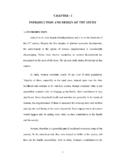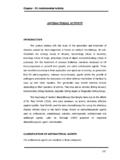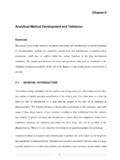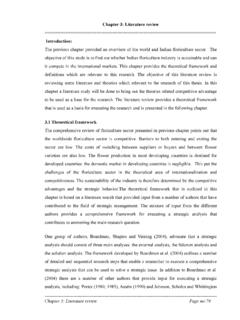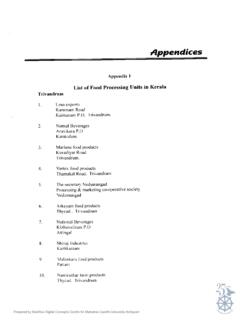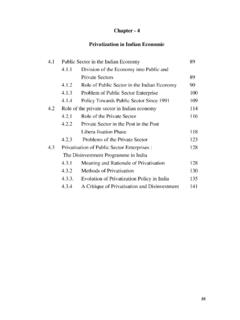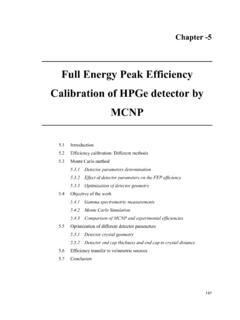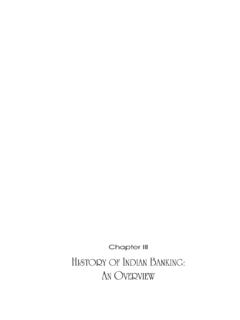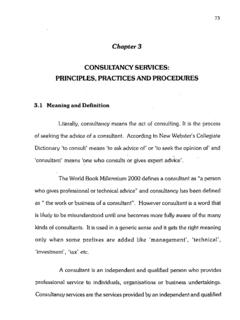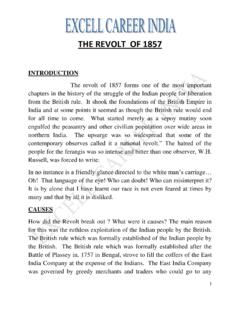Transcription of CHAPTER THE FIRST WAR OF INDEPENDENCE (1857) AND …
1 CHAPTER THE FIRST WAR OF INDEPENDENCE (1857) AND THE INDIAN INVOLVEMENT IN THE TAIPING UPRISING OF CHINA: THE BEGINNING OF A COMMON ANTI-IMPERIALIST STRUGGLE BY THE INDIAN AND CHINESE PEOPLE After having a period of brisk contacts of trade and cultural exchanges for more than ten centuries since the beginning of our common era the people of India and China (cultural cousins of the past) suddenly found themselves tied together by British colonial chains and became, ironically, "colonial cousins" during the 19th century. It was the common enemies of India and China ( Pax Britannica) which united the two ancient civilizations again in their common anti-imperialist struggles. In the middle of the 19th century two explosive events in Asia shocked the Brave New World.
2 One was the FIRST War of INDEPENDENCE in India in 1857, and another was the Taiping Revolutionary War lasting 15 year from 1851 to 1864. Apparently, the two events were drastically different in nature. While the Indian uprising was against the foreign rule, the Chinese rebellion was aimed at overthrowing the domestic government. There were other differences such as the class compositions of the two revolutionary forces and Taiping's being fueled by a new ideology which had a Christian element while this was not the case with the Indian uprising. But if we examine the Taiping Movement in depth, its anti-imperialist character becomes discernable. The difference of these two major events arose from the different approaches of British imperialism in colonizing India and China.
3 While London took up a direct rule in India, it adopted a more sophisticated method of "ruling the periphery by the periphery" 12 in China Britain FIRST waged the Opium War to scare the Manchu government out of its independent spirit and began to employ the latter as an authority in servitude to open up China for the British game-play of exacting super-profit The Chinese peasants realized the degeneration of their national government to a willing instrument of British imperialism. So, they launched the Taiping Revolution to get rid of this British instrument. Though they did not openly raise the anti-British slogan as their Indian brethren did, their revolutionary intention had an unpronounced anti-imperialist element.
4 Whatever the western historians (particularly those who want to whitewash British imperialism) want to obscure the true anti-imperialist nature of the Taiping Movement. The British government in London at that time understood it better. It mobilized an international and also Chinese force to put the Taiping down. It used the Manchu regime to fight a proxy war against the Taiping Revolution. It was an undeniable fact that without the international intervention engineered by Britain the Taiping challenge would not have disappeared so quickly while the Manchu government would not have saved its skin so easily. All this provides the historical context for me to take up the mutual support between the peoples of India and China in their common struggle against British imperialism and its Chinese instruments.
5 Since peoples of both the countries were in the abyss of misery, strong sentiments and sympathy developed for each other specially in the hearts of sensitive and people of insight. They longed to know the sufferings of the people and state of affairs of the either side. As a result a hazy picture of many events occurred in front of them and there within 13 they could collect and know a few real happenings of the either side. How the uprising of 1857 and Taiping uprising influenced each other is a question of debate lt would be my humble attempt to clarify some doubts through the available data from all possible sources. After analysing the material it becomes clear that there were no direct contacts between the leaders of these uprising despite the fact that some Indian troops joined hands with the Taipings.
6 Interestingly there is no such material prior to the outbreak of The FIRST War of Indian INDEPENDENCE which indicates that Indian forces deployed in China switched sides to the Chinese people, since the Taiping uprising was not the only occasion when the British deployed the Indian troops in China and the Chinese fought the British. Shortly before the Taiping uprising the Chinese fought against the British during the FIRST Opium War (1840-42), later the Second Opium War (1857-60) was fought. It was only after the outbreak of The FIRST War of Indian INDEPENDENCE that the hatred and the feeling of revenge for the British among the Indian troops in China erupted like a volcano. Certainly, the spark was provided by The FIRST War of Indian Indepeendence.
7 Another fact which simply cannot be refuted is that both played an important role under objective conditions whereby both rendered mutual support to each other under objective conditions. Immediate reaction of the British In March 1958 Elgin, a special British envoy, proceeded from India to China with British forces and collected some troops from 1\lauritius and other places. On 17th March Lord Harris at Madres telegraphed to Canning recommending him to stop the army going to China under lord Elgin and General Eshburbham and to render it immediateley 14 available for indian Elgin had just reached Singapore, when he received a letter from Canning urging him to divert his forces to India as situation in India was quite volatile.
8 The uprising of 1857 was a massive show of strength by the patriotic forces with the sepoys as the backbone. They were all out to capture Delhi and expel the aggressors from their motherland. The situation was tense, and Canning, the Governor General of India, apprehended that it would be difficult to hold Delhi. It was due to this that he apprised Lord Elgin who was proceeding to China of the situation in India and requested that the soldiers under the latter's command and those who were on their way to China be diverted for deployment in India, for safeguarding and restoring the British possessions. In his letter of May 29, 1857, Canning wrote, "I write for the purpose of representing to your Lordship the urgent need in which India now stands of assistance by European troops and of invitieng your Lordship to consider whether the military force which is placed at your disposed for services in china should not FIRST be employed in restoring safety to our Indian possessions in Bangai'' after the capture of Delhi Canning wrote "Everyday during which Delhi rem~1ins in the hands of rebels is an encouragement to a rising else where, this state of thing is full of danger.
9 " He also mentionened that it would be difficult ot suppress the rebellion with the force which they have in hand at present in India and the European forces called from Persia cant be at Calcutta for some weeks and may take many weeks on its journay "the need therefore is very great and urgent" therefor he said "I request to your Lordship with my earnest request that you will give to the Government of India your utmost aid in European troops and will consent to The History of Indian Revolt, London: 1859, 15 move the regiments at your disposal to Calcutta before employing them in China."2 In his reply to Canning in a letter dated June 4, 1857. Elgin replied in the following words, "I have only to add what I am sure it is hardly necessary for me to in press on your Lordship that in diverting from their destinations a portion of he troops intended for China, both the General and myself feel that we are incurring a heavy responcibility and making a great sacrifice and that we confidently rely on your Lordship to put us again at the earliest period in possession of the full amount of our allotted force which we believe to be by no means more then adequate to the work we have in hand.
10 " meanwhile he wrote that "I have sent order by the "AUKLAND" to Panang directing the officer commanding 'The Simoon' should be touch there, to proceed at once from that point to Calcutta. "3 Lord Canning wrote back to Elgin on June 24, and thanked him for so radily acquisitioning in the request for the troops and wrote further out of complusion that Elgin will send to Calcutta every European soldier that he can spare of shore "which are on their way from England to China. 4 In regard to the European soldiers in Singapore Egin replied to Canning in these words," there is not one European soldier at the place and at Hong Kong if our latest advices be correct we have only one very weak European Regiment and a few arlillery men.
